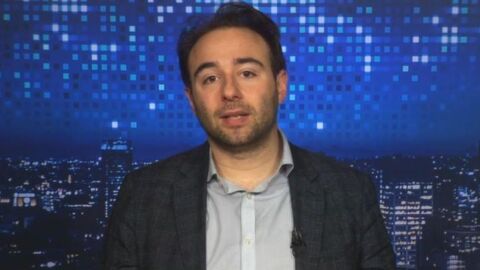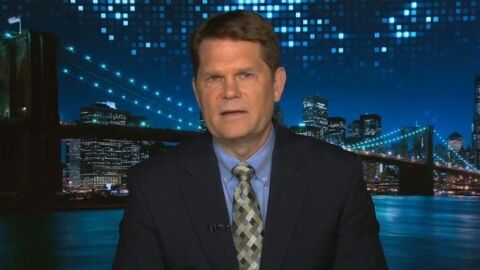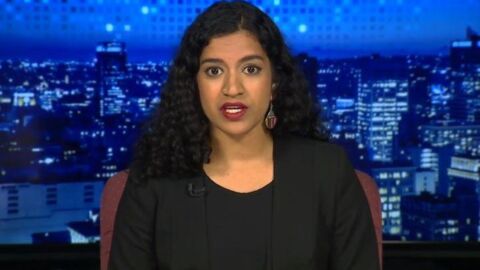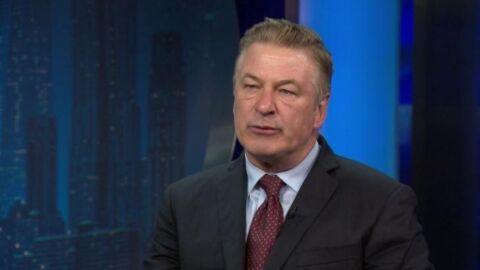Read Transcript EXPAND
CHRISTIANE AMANPOUR: And next, we turn to our guest, the award-winning actor Alec Baldwin. In the past three years he’s become an even more familiar face by impersonating President Trump on Saturday Night Live. Baldwin’s latest role is another larger than life character. “Framing John DeLorean” tells the story of the car executive best known for making the famous time-traveling vehicle in “Back to the Future”. Rocked by scandal, his company ultimately went bust, though. He joined our Walter Isaacson to talk about the biopic, how he gets in character to play President Trump, and why he’s considered running to replace him.
(BEGIN VIDEOTAPE)
WALTER ISAACSON: Alec, welcome to the show.
ALEC BALDWIN, ACTOR, “FRAMING JOHN DELOREAN”: Thank you, Walter.
ISAACSON: Hey, opening Tribeca Film Festival with a John DeLorean sort of combination doc and film. Do you like John DeLorean as a character? I mean, he sort of fits into your style.
BALDWIN: Oh, no!
ISAACSON: That was a compliment.
BALDWIN: Oh no. OK. Well I’ll try to find a way to take it as a compliment. I’ll work on that. But the — well you know, years ago when there was a — I’m not going to say a fever, but there was more of a — of a fizz to doing a DeLorean film, he called me. I got a call from John DeLorean and he said, “Alec,” with that Michigan accent of his, he said, “Alec, I’d like you to play me in the film.” And I said, “oh my god, that would be great.” And he was living — I think actually he had been put out of his New Jersey — his Bedminster estate, which is now Trump’s golf course.
That was — that was DeLorean’s home. And he was evicted from there because of his financial reversals, and he wound up living in some other home near there. But I spoke to him on the phone about me playing him in a movie which never came about, and now this came. And I think that I was intrigued by the hybrid of the doc footage and the re-enactment footage, and I think that in terms of creating the character, it wasn’t easy.
Because to do DeLorean, who’s taller than me, leaner than me, there was a prosthetic makeup job that might have taken three hours, which we couldn’t afford that time-wise. So we came up with something with the best makeup artists that I know, who are also very quick, which are the Saturday Night Live people.
ISAACSON: When I first saw some clips of this, I saw John DeLorean unveil the car and it took me awhile to realize it was you. Let’s — let’s look at a clip of this.
(BEGIN VIDEO CLIP)
BALDWIN: “I know that we may be the new boy on the block, but I also know that on this, the bicentennial of the American Revolution, we can start making our version of the American dream a reality. Allow me to introduce the first incarnation in the evolution of my dream, our first vehicle, code named the DMC 12, the DeLorean motor car.”
(END VIDEO CLIP)
BALDWIN: I love movies because there’s so much practicality involved, so in order to have everything work in that shot, we had two men crouched down on the floor of the car who opened the gull wing doors on — on cue. And Morena Baccarin who plays Christina Ferrare, his wife at the time, is fantastic in the movie and she’s a wonderful actress and Josh Charles is playing the other part.
ISAACSON: And he has an incredibly driven character, he had cocaine problems, everything else. When you do a biopic like that, do you see how the personality all weaves together, and it’s sort of all part of one guy?
BALDWIN: DeLorean’s story is difficult to me to grasp, because it’s kind of an unresolved story. DeLorean himself, he never actually came clean about why he did some of the things he did. He was a kind of a very furtive and very kind of a cagey animal who evaded prosecution for the — he beat the system in the cocaine charge. I think he was somebody who had a — just an almost paralyzing allergy to failure. There was no way he was going to fail. So to go and get the funds from selling drugs and — and the other crimes he committed — because there’s a lot of things about DeLorean people don’t know, other things that were kind of larcenous or exploitative of people.
ISAACSON: So the crimes, in a way, explain what they were, were somewhat part and parcel of his personality.
BALDWIN: Well I guess a jury eventually — if I have it right, a jury eventually saw that — or recognized that DeLorean was entrapped to — in a drug deal. And they went and got all this cocaine, they were going to move and access money to help bail out the failing project. Now the project — if the story is told properly, the project, what he wanted to do, there was a lot of good things about that car company. He was going to — they were creating jobs in Ireland and they were going to manufacture a car.
One of the things that was the most surprising to me was how anemic the car actually was as a sports car. They were in a hurry to get this thing — once they got the money and had delivery dates and stuff like that — it’s a business with a timeline, they didn’t have time to put the right engine in the car. So if I’m not mistaken, they got a six-cylinder lotus that fit the body. They did it backwards. They did the body first and the engine after that. And the car was like a — power-wise, was — I mean, it wasn’t a golf cart, but it was not much more. It was just a little bit more than that. And many people thought that the car, like DeLorean himself, looked beautiful on the outside and was very insubstantial on the inside.
ISAACSON: When I watch you do John DeLorean, I think of you really getting into character. And the one, of course, that you do now when you’re so into the character is Donald Trump.
(BEGIN VIDEO CLIP)
BALDWIN: “So I’m basically taking military money so I can has wall. So I’m going to sign these papers for emergency, and then I’ll immediately be sued, and the ruling will not go in my favor, and then I end up in the Supreme Court, and then I’ll call my buddy Kavanaugh, and I’ll say it’s time to repay the Donnie and he’ll say new phone, who dis?”
(END VIDEO CLIP)
ISAACSON: When you get into Donald Trump, I mean, do you still enjoy it? Because it’s — it’s so fresh every time you’re on Saturday Night Live doing it.
BALDWIN: Well you know, you have a — it’s such a dichotomy, the people’s response. I mean, I have people — the majority of people who will meet me are very kind and they say, I love what you’re doing and they walk up and whisper to me and they’re very polite and say “thank you so much for helping us get through this nightmare” and so forth, and then there’s people, typically online, who are far away, who say, you know, “you suck and you’re the worst impersonator I’ve ever seen in my life” and what have you. But truly, I thought — the — the thing about the cold opening on the show, which you are literally firing a cannon.
It always ends up with you saying, live from New York, it’s Saturday night and whether your co-stars are members of the company, like Kate, or Beck ,or there are other guest stars like Ben Stiller, or De Niro and so forth, there’s a pace and there’s a vitality to it that doesn’t necessarily allow for the most precise Trump impersonation. What we’re doing is — is — is a figure of Trump, we’re doing like an essence of Trump. His corrupt, amoral, Machiavellian nature is at the fore and doing a real Trump, that’s for another project.
ISAACSON: Well in some ways — I mean, you’re from Long Island, you grew up in this milieu, you kind of get Trump, it seems to me. I mean, do you feel that you really understand this guy?
BALDWIN: No, I don’t. I mean, I — I’ve said this before. For my podcast, I hosted an episode that we did with Michael Wolff, and it was at the crest of that “Fire and Fury” release of his book, and we were at a town hall and I remember saying for the first time — and I’ve said this a couple other times — that, you know, the presidency of the United States, which you know better than I do — I mean, you’re a historian, you know better than I do — that this is a vista like no other vista in life.
You have a job of which you see the — the — the kind of panaplea of life, good and bad, what people are doing, including our own country, around the world, good and bad and you meet the creme de la creme of society — thinkers, athletes, artists, military men and women, you have a chance to see the world in a way that — that everybody that’s had the job, this — this seat has changed them. Except Trump. Trump is the only man in American history that the presidency of the United States has had no effect on him whatsoever. It hasn’t changed him. I thought he would change.
After he won, which was horrifying to me, because if you’re a New Yorker, you’re on to Trump. He’s not the host of “The Apprentice” who’s fooled over all these fly-over Americans that he’s this crack businessman. We kind of know that he’s something else. But even so when he won, I thought to myself, he’s going to change. Give it a year and we’ll see a different Trump. And no. He’s the same now — which, this is the real tragedy. He’s exactly the same today as he was back in November of 2016.
ISAACSON: You just talked about the flyover Americans, though. I mean, do you — you must understand the resentment a lot of people feel in this country —
BALDWIN: I do. I do.
ISAACSON: — that leads to a Donald Trump.
BALDWIN: Well I — when I say flyover Americans I mean that — that’s a show business term in terms of demographics and I don’t mean that with any — in any pejorative sense. But I mean, I — I live in a world where nobody watched “The Apprentice.” Nobody I know in the world I lived in in New York or L.A. or in the world I live ever watched “The Apprentice” — “The Apprentice” was a tedious kind of silly show that was on the air that was a triumph for them and for Burnett and all those people.
They made a lot of money. But the idea that you’d show an edited version of this kind of hyper stylized reality show and say that that’s who that guy is; it’s — this is acting. There was an article, which I’m sure you saw, that Larissa MacFarquhar wrote in the New Yorker were all about Kentucky and — I think it was Kentucky or West Virginia where she went down there.
And that’s what they were saying. They were saying “we don’t necessarily support Trump or admire Trump but we know how much you hate him, elites” — northeaster elites in their mind. “And — and this is our chance to say F.U. to the rest of the country,” which I found numbing.
ISAACSON: He has a lot of quirks in his — the way he looks and talks, and you’ve mastered them. I mean it is — when you come on cold on “Saturday Night Live,” it’s like you’re doing John DeLorean and looks just like him. Show me some of the tricks; show me how you do it. You know just what it is that makes you able to get into it?
BALDWIN: You know, what we do is a caricature. I mean it’s like an Oliphant drawing. You know we don’t really — we don’t really go for a — it’s like Steve Brodner, everything is an exaggeration. But you know the thing about Trump was to just always look miserable. That was the key. You should have your face — no matter what someone would say. It’s a beautiful day outside. “Is it, is it really beautiful outside? Is it a beautiful day?” Like nothing people can say that can change you from this deep, deep, deep pit of unhappiness that I think he lives in all the time. Because I — because this is not going the way he imagined.
How many people who’ve been president had been treated this way? I mean even Regan; liberals, democrats, people who didn’t agree with the — you know they backed but they didn’t say unkind things and say well he’s got Alzheimer’s. You know they — they — they lay it off out of some respect for the office if not the man. George W. H. Bush, they started giving him a little bit more of the business because of the illegitimacy of the election in Florida in 2000, that I think fueled some of that. But with Trump I’ve never seen anybody that held this office be treated the way this guy is. It’s uncanny.
ISAACSON: Do you think the Democratic Party has gotten so jangled by Trump that they’re in danger of fragmenting, going off the deep end, not having a real message that appeals to the people in America about where we should go next?
BALDWIN: Well, I think Trump has had an effect on them and perhaps a little bit more than — than your ordinary incumbent republican. But you know I said recently on — online; I said I’d love to run for president and I viewed beating Trump as something that was easy to do. And I think that you need to have somebody come in and have a very tight message for the American people like — like if you come into the hospital and you break every bone in your body but you punctured an artery, we have to fix the thing that’s going to kill you first and then we’ll fix — we’ll set all your bones later.
This country has to prioritize its needs and there — let’s say there’s ten things you want but five things you need, and we must do the five things we need. First healthcare, immigration, education, environmental protection, infrastructure. I mean I’ve got my own list. But when you hear specific left-leaning democratic candidates and progressive candidates talking about these buffet tables they want to set up of public policy, well that one word about how they’re going to pay for it, that’s what’s going to kill the party in the next election.
ISAACSON: So you seriously have thought about running. Might you actually think of doing this in the coming year?
BALDWIN: Well, I want to be very clear of it — I mean I would love to — well its two things; one, I would to be the president. And I think I would be a good president, because I think I get it in terms of, you know, the idea that — that you know there’s things I don’t know. Nearly all those men came into office and there’s things they didn’t know. I believe that there are people who are running for office that what they have, that I don’t have, I can get. But what I have, that they don’t have, they can’t get.
Which is a world view that the government has to move toward helping the greatest number of people. Now the — do I think I would actually do it, probably not because it’s so crowded now and the media is kind of on board with — or right away anointing.
“This one sounds good, here’s a poll, this one’s not doing so well;” the game that the media does very often, which is that — and I think if I ran they would kill me. They would just kill me. Even though a comedian who imitates the president just won the presidency of the Ukraine. That was very — that was very inspiring to me.
ISAACSON: You’ve had an amazingly eclectic career. And I first began — became a fan when we were young, and I saw you play “A Street Car Named Desire” on stage. You played, you know, Stanley Kowalski, got into that character. Tell me about the arc of your career because I think it may be the most eclectic career ever. Things from stage plays to game shows to softball player to podcaster to author.
BALDWIN: You know, there was no plan in the sense that there’s a — there’s a way you can work in this business and let’s say — it’s not a long list, but there may be three or four things which are good advice, if you want to succeed. I think one of those things — and I even tell people from time to time is, is don’t become too politically outspoken. The people that are the biggest movie stars in the world today are people you know nothing about their politics. It’s very private. But to go and become very partisan and to go and become very vocal, attacking a president who has the support of some significant swatch of the country is always a risk. I mean, I’ve actually been fired from jobs. I’ve lost jobs.
ISAACSON: You had the messy divorce with Kim Basinger and the fights over custody.
BALDWIN: Yes.
ISAACSON: What did you learn from that?
BALDWIN: What I learned, and I’ve told people before, is that when you’re in court, be patient to let the bitterness leak out and to ebb because if you do what I did — and I mentioned this in the book, which is to win a ruling, and then within months go back in and try to expand, and expand your ruling, and antagonize the other side because they view — the other party and their lawyers view it as a competition. Don’t settle for the boilerplate you get, and wait. And just live with it for a year, a year and a half, two years. You’re entitled to more, you know you’re entitled to more, but let the anger subside, and — which I did not do. I went in every three months saying, I want my rights. You know, and what you realize is you don’t have any rights as far as the court is concerned.
ISAACSON: You talk about letting anger subside. Did that help you manage — you know, you used to get in fights a whole lot, have anger problems and stuff. Has that helped you sort of with the family calm that down now?
BALDWIN: Well you know, this thing happened with this guy in front of my building where they said that I punched this guy and what was really sad for me was there’s cameras everywhere and I guess we’re about to go maybe into some civil proceeding, I don’t know. Because I feel badly in the sense that this guy’s wasting his time and my time because there’s cameras everywhere that dispute it. I mean, he lied to the police. If he says that I punched him in the face, that’s a lie. But what I think is important is, number one, any physical altercation that you get into with people like that is not a good idea. But every single one of them I’ve had, has been with a tabloid, paparazzi media member, and there was a provocation involved.
I have never — I mean, I don’t think I could survive in my business. I have never had an altercation with somebody in that quadrant of the media that wasn’t provoked. If a guy’s across the street with a long lens, I don’t go running across the street, say “hey, what are you doing.” But men who’ve come to my home during specific events in my life, and they almost chipped my wife’s teeth with a lens of a camera, you know, snapping it in her face, anything like that where you get provoked and cross a line, you – – you lose. You’re the loser.
ISAACSON: What is your aspiration? What would be the great thing you’d love to do in a few years when you’re ready to do something big?
BALDWIN: Next year, in 2020, I will have done this for 40 years. Now what I want to do, I don’t know. My wife and I are thinking about maybe moving overseas for like a little holiday, like a year to live in Spain, because my wife is from Spain. We have all kinds of ideas of different things we might do because I’m 61. And I have a five-year-old, a three-year-old, a two-year-old and an 11-month-old. So I want to make the most of the time I have left, and as my friend said, when I turned 60, he said remember that you have — you still have plenty of time, but none to waste.
ISAACSON: Alec Baldwin, wow, thanks for being with us.
BALDWIN: Yes. Yes, thank you.
ISAACSON: Thank you.
BALDWIN: Thank you. Yes.
About This Episode EXPAND
Christiane Amanpour speaks with former FBI Special Agent Michael German about the recent synagogue shooting; author Yascha Mounk about the state of Western democracy; and activist Varshini Prakash about climate change. Walter Isaacson speaks with actor Alec Baldwin about his career.
LEARN MORE



